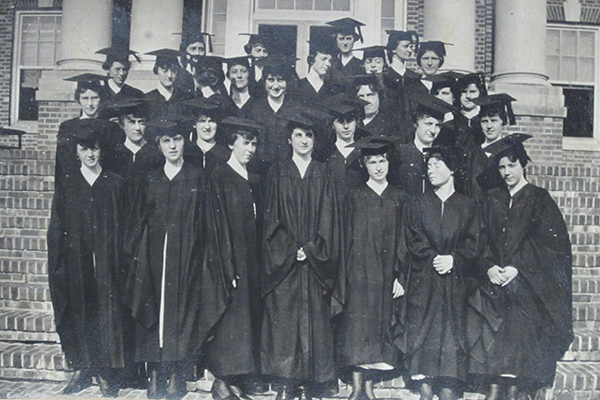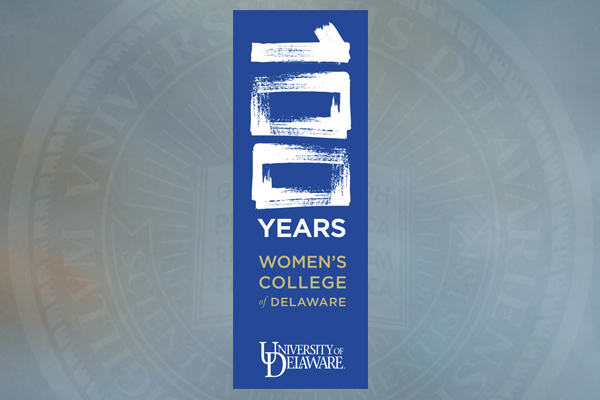Women's College centennial
College for Delaware women formally established in October 1914
3:19 p.m., Oct. 7, 2014--One hundred years ago this month, in ceremonies attended by a host of dignitaries and thousands of spectators, the Women’s College of Delaware was dedicated in Newark, marking what published reports called “a new era in the history of higher education” in the state.
This year, the University of Delaware is marking the centennial of that occasion with various educational events, displays and speakers. They will highlight the history of women’s education at UD, particularly the history of the Women’s College and pioneers such as the college’s first dean, Winifred J. Robinson.
Campus Stories
From graduates, faculty
Doctoral hooding
Robinson was formally installed as dean on the day of the Women’s College dedication, Oct. 10, 1914. Her installation that afternoon, presided over by Delaware Gov. Charles R. Miller, followed the morning’s inaugural ceremonies for Samuel Chiles Mitchell as president of the all-male Delaware College.
The creation of the Women’s College had been championed by another pioneer, Emalea Pusey Warner, who as chairperson of the Delaware Federation of Women's Clubs' Committee on Education had worked diligently toward the specific goal of establishing a state-supported college for women. In 1914, she was appointed chairperson of the Advisory Council of the Women's College and later became the first woman member of the Delaware College Board of Trustees.
In an earlier publication, Robinson wrote about the new college’s mission: "The purpose of the Women's College is to provide academic work of college grade that is especially adapted to the needs of women.” She believed not only that single-gender education provided the best academic atmosphere for women but also that it provided a space for women to grow in solidarity and social graces.
Faculty lived with students in the dormitories, which were designed to create a homelike atmosphere, and took their meals with students as well. The Women’s College of Delaware was seen by Dean Robinson and its faculty and students to be a full academic world for women, a place where both minds and spirits were to be nurtured and trained for greater purpose.
Special events and activities that are planned to mark the 100th anniversary of the Women’s College include the following:
Celebration of Warner Hall. Warner Hall, the oldest residence hall on campus and named for Emalea Pusey Warner, will be the site of a birthday celebration from 7-9 p.m. on Friday, Oct. 10. The celebration is free, but registration is requested at this site.
Student-produced blogs. Students in the Living Learning Community and First Year Experience led by Vicki Cassman, associate professor of art conservation, and Martha Carothers, professor of art, are conducting research about the era of the Women’s College and its contrasts with women’s education at UD today. Students will use historic and contemporary images and write “then and now” descriptions, which will make up a series of blogs on topics ranging from women academic leaders to athletic opportunities to careers. The project is expected to begin and be available to the public on Oct. 10.
Displays throughout the academic year. Visual reminders of the anniversary will be displayed during the year. Students Olivia Prinzi and Emery Coopersmith, both seniors in the Department of Art’s visual communications program, have created a commemorative logo for use in various outlets.
Women and Gender Studies colloquium. A lecture series, open to the public and also part of the course “Research on Women,” is being held throughout fall semester; sessions meet from 1:25-2:15 p.m., Wednesdays, in Room 005 Kirkbride Hall. Sessions have included the history of and a walking tour of the Women’s College, the history of the women’s studies program at UD, and African American women in higher education. Future sessions will include research on gender-based violence and gender in academia.
Exhibition in Hullihen Hall lobby. University Archives is planning an exhibit in the cases in Hullihen Hall’s lobby for later this semester, commemorating the 100th anniversary. This new exhibition will cover Delaware College’s brief period of coeducation in the 1800s and the creation of the Women’s College of Delaware. Particular focus will be given to student life, both social and academic, from the first class of pioneers arriving in 1914 until the merger with all-male Delaware College in 1945.
Saturday Symposium. A Nov. 1 Saturday Symposium on World War I will include highlights of the contributions of women during the Great War. The 1:30 p.m. presentation will be given by Margaret D. Stetz, Mae and Robert Carter Professor of Women's Studies and professor of humanities. For more about the symposium and to register, click here.
Speaker series. Plans are being made for speakers to visit campus during the spring semester to discuss issues relating to the history of women’s education.
More about the Women’s College
The Women’s College of Delaware opened in 1914 as an affiliated institution with the all-male Delaware College. Both colleges were open only to white students at the time. Women had attended Delaware College from 1872-1885 during a period when low attendance, the need for revenue and a college president favorable to educating women had caused admission to be open to both genders. Some members of the Board of Trustees, the faculty and the student body remained opposed to coeducation, however, and as the number of women enrolling dwindled, the Board of Trustees voted to bar their further admission. The few women still enrolled were permitted to finish their education.
In 1921, Delaware College was renamed the University of Delaware, and in 1945, it merged with the Women’s College to become a coeducational institution.
To read more about the history of UD and its predecessor institutions, see the books Beneath Thy Guiding Hand: A History of Women at the University of Delaware by Carol E. Hoffecker, retired professor of history, and The University of Delaware: A History by the late professor of history John A. Munroe
Article by Ann Manser
Photos courtesy of University Archives













